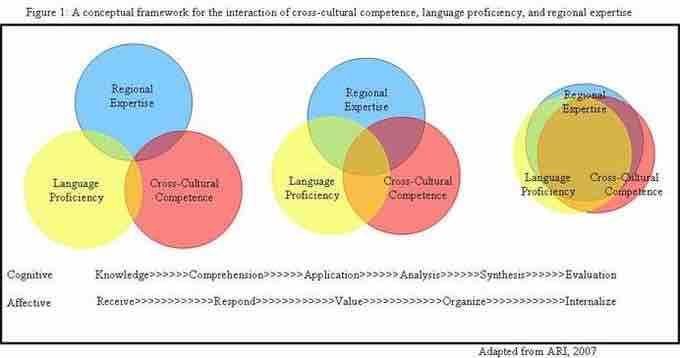With an understanding of the high value of diversity, managers must next contemplate what differentiates employees. Managers who are capable of understanding the varying cultural, gender, or ethnic backgrounds of their workforce can optimize collaboration and minimize any friction that may arise as a result of these differences.
Intercultural competence is an individual's ability to communicate with, and adapt to, the cultural norms and expectations of each employee or customer. This cultural competence is imperative for managers to succeed in a globalized world.
A Model of Intercultural Approach
Perspectives vary as to what constitutes intercultural understanding. The following figure highlights the three building blocks of one intercultural approach: cross-cultural competence, language proficiency, and regional expertise. This model suggests that the development of each building block allows for the largest potential crossover between the sections, and that employing them in concert provides the largest potential level of competence for an intercultural manager.

Intercultural competence
This chart illustrates the three factors that constitute an effectively intercultural understanding for management: Regional Expertise, Language Proficiency, and Cross-Cultural Competence
The blue and yellow circles in the diagram highlight the importance of understanding the local language and visiting regions to achieve immersion in a particular cultural mentality.
Still, cross-cultural competence is a relatively vague concept. The wide spectrum of academic studies that have addressed it have only served to complicate ideas about what constitutes a well-rounded cultural perspective. The U.S. Army Research Institute may have come closest to summarizing what it means to be cross-culturally competent: "A set of cognitive, behavioral, and affective/motivational components that enable individuals to effectively adapt in intercultural environments."
Development of Intercultural Competence
Managers who are interested in developing the capacity to think about and isolate differences between people must be open to immersing themselves into as many cultures as possible.
Immersion is best achieved through interacting and communicating with people from other cultures often enough to face and overcome the intrinsic obstacles that may present themselves. These experiences serve as motivators for each individual involved. Intercultural exchange drives both manager and employee to think further about what predispositions each holds and how best to maximize the positives and minimize the negatives.
Individual Strengths in Accepting Differences
On a more individualistic note, the exercise of a few key introspective skills may also serve to lessen friction:
- Knowledge – Acquiring a thorough understanding of history, cultural norms, basic language, and religion is valuable.
- Empathy – Trying to understand the views and feelings of others from their perspective is important in all forms of management, but particularly relevant when differences in cultures are present.
- Self-confidence – Understanding personal weaknesses and difficulties in adapting to situations is important in controlling reactions.
- Cultural identity – Coming to terms with another culture requires cultural self-awareness, which creates a critical benchmark. Objectivity in this respect is highly valuable.
To attain a high level of cultural awareness, along with intercultural communication skills, requires thinking about and understanding different people and their respective cultures. Managers who pursue intercultural competency while possessing a strong understanding of their own strengths, weaknesses, and cultural identity will more effectively immerse themselves into the cultures of co-workers.